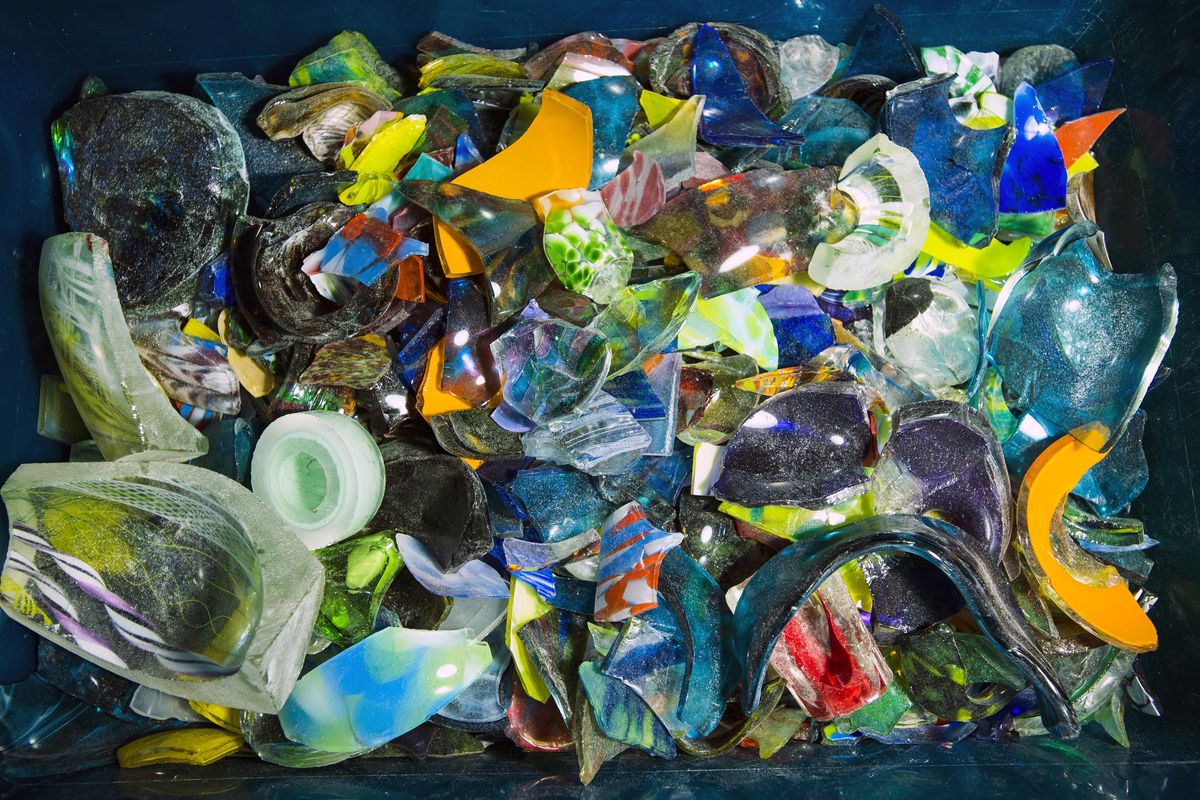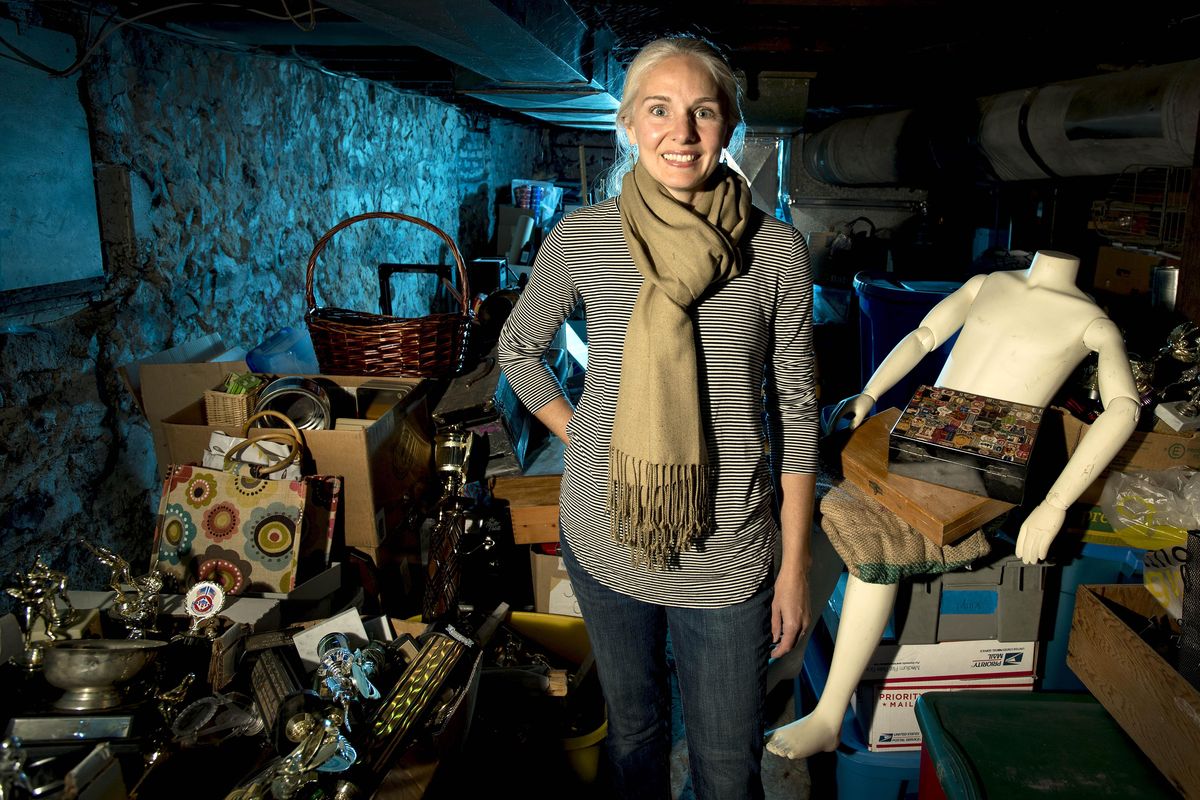Creative reuse nonprofit aims to make art more accessible
Katie Patterson Larson runs a program called Art Salvage, which connects gently used art supplies with new artists and creators. It's in the process of looking for a storefront. Meantime, the supplies are stored at Katie's home basement. (Colin Mulvany / The Spokesman-Review)Buy a print of this photo
Watch your step. The way down to Katie Patterson Larson’s South Perry basement is steep and narrow. The ceiling’s low-slung, so watch your head, too.
But this space at the bottom of the stairs – dark and boxed in by thick rock walls – is where the wonderland lies.
Stacked atop pallets and in plastic bins are vintage board games, old sports trophies, new paintbrushes and shards of colored glass. There are fabric scraps in this box and mismatched buttons in that jar. There’s burlap, beads and bottle caps, corks, crayons, and colored paper, markers, antique maps, yarn, thread, glitter, felt, pom poms, doll parts and even the occasional headless torso.
There’s enough gently – even never – used arts-and-crafts supplies to stock an entire store. And that’s the dream. Patterson Larson, founder of Art Salvage, a creative reuse nonprofit in Spokane, is hoping to be able to open a shop in early 2018 to sell these discarded treasures and make art more accessible.
“Our goal is to keep these things out of the landfill and enable people to see the value in stuff through recycling and reuse,” she said.
Patterson Larson started Art Salvage three years ago with her own materials left over from crafting and art projects. She also began collecting odds-and-ends from friends and family members and searching out old art supplies at estate and yard sales.
Today, donations – from artists, scrapbookers, knitters, sewers, other DIY-enthusiasts and parents whose children outgrew that game or no longer use that set of watercolors or tube paints – fill not only her entire 1,060-square-foot basement but also her second-floor craft room and the shelves of the bookcase in her home’s entry way.
Her parents are storing larger items in their garage. Board members are storing donations at their homes, too. “And another dozen or so people are holding back donations until there’s capacity,” or Patterson Larson said, until Art Salvage can find a space of its own.
The aim is to get these donations out of her house and into a shop so they can be upcycled or repurposed by other artists, crafters, kids, families – anyone, really – throughout the community.
Art Salvage repackages surplus items and resells them at a fraction of the original cost, cutting down waste and offering “accessibility to affordable materials. Really affordable,” Patterson Larson stressed. “That’s the catch-phrase for creative reuse.”
Patterson Larson, 35, founded Art Salvage in 2014, after moving back to Spokane from Portland, where she got involved in the creative reuse movement by donating to and buying from SCRAP PDX, a donation-based store that sells school, office, party and arts-and-crafts supplies. Seattle and Boise have similar programs.
But, Patterson Larson, “There was really nothing like it in Spokane.”
Patterson Larson grew up in Spokane, graduated from Ferris High School in 2000, and met her husband, Jens Larson, in the Midwest during college. She studied art and minored in psychology. He followed her to Portland, where they both attended graduate school.
She has a master’s degree in counseling and art therapy, and worked as an art therapist in Portland before moving back to Spokane eight years ago. Since then, she’s been staying home to parent their daughters, now 4, 6 and almost 8.
And, “That’s where the idea (for Art Salvage) came from,” she said. “I wanted to be involved in the art community.”
But she wasn’t sure whether she wanted to go into private practice or back to work for an agency – or try something different. She saw this need and thought she could help fill a niche.
She started small, with a vintage suitcase full of yarn along with some wooden baubles, beads and other bits and pieces. “I just put it out there,” she said. “My initial idea was just to test the waters.”
Patterson Larson began staffing a booth at the Thursday Market in the South Perry District shortly after launching the Art Salvage website in fall 2014. At first, she said, it took people awhile to understand what Art Salvage was all about and that her miscellany was, in fact, for sale.
When they got the idea, she said, “Their faces lit up, and they wanted to talk about their own projects and stuff that they had found and made, and I made so many connections. People wanted to know: Are you going to hold classes? Are you going to open a store?”
The answers? Yes and yes.
In 2015, Patterson Larson invited several community members to serve on an advisory board and help craft bylaws for the organization. The Law Clinic at the Gonzaga University School of Law helped sort out the legalities. And, in 2016, Art Salvage became an official nonprofit.
Members of the advisory board became members of the board of directors. Today, there are five: Patterson Larson, who is president, along with jewelry designer Amy Mickelson, artist Megan Perkins, interior designer Chloe Buerstatte and metalsmith Joslin Koren.
“We’re optimistic,” said Mickelson, vice president of the board. “Our hopes are that in five, 10 years that our store will be thriving.”
Mickelson, 59, learned about the creative reuse movement from an article she read in the 1990s and “kind of tucked the idea in the back of my brain.” When she met Patterson Larson at the farmers market three years ago, she already knew she wanted to help out. “It was serendipitous because I live down the street,” she said. “It was very convenient.”
Today, she’s storing donations in her garage and back room.
“We need to get a space so we can get the store up and going,” she said. “We also need more volunteers, too. But it’s hard when you don’t have a space. It’s that Catch-22. We’re going to have to rely on volunteers to staff the store and make kits and sort donations.”
Typically, Art Salvage will accept items such as clay, charcoal, stencils, canvas, glue, easels, frames, old magazines and blueprints, construction paper, cardstock, old calendars and postcards, feathers, silk flowers, pipe cleaners, stickers, shells, marbles, ribbons, leather and wool scraps, cigar boxes, jewelry, popsicle sticks and dowels. (A complete list can be found on its website at www.artsalvagespokane.com.)
It won’t take appliances, used clothing or linens, food containers, computers, ink cartridges, furniture, dried-up markers, dirty items or anything flammable.
“We love the community support in donations,” Patterson Larson said. But, until the organization finds a location of its own, she said, “donations are on hiatus.” Art Salvage is simply running out of room.
The plan, Patterson Larson said, is to run a crowd-sourcing Kickstarter campaign to raise funds for a creative reuse shop and center. Donated space – or a discount on rent from a landlord who supports the arts – would be ideal.
Patterson Larson is looking for a minimum of 1,000 square feet with room for sorting and storage as well as retail and workshops or classes. Parking would also be a plus. So would a spot on the outskirts of downtown – and a move-in date in late winter or early spring.
Meantime, Art Salvage continues holding workshops, classes and volunteer work parties, about one or two per month. Events – how-tos on bookbinding and making jewelry, jam-jar terrariums and artist trading cards – are hosted at spots around Spokane, sometimes local businesses or places such as the public library or Spark Center in Kendall Yards. Once the storefront opens, Patterson Larson said she’s hoping to be able expand programming. She’ll also have a place to meet with board members and volunteers. She’s hosting volunteer work parties at her home.
To help raise money for a storefront, volunteers are assembling collage, embroidery, cork-stamp and other kits, or art projects to go. The kits sell for $10 to $24 at Terrain’s pop-up shop in Steam Plant Square. The shop at 159 S. Lincoln St., features the works of 20 local artisans or groups such as Art Salvage. It’s open from 11 a.m. to 6 p.m. Wednesday through Saturday.
Volunteers will likely staff Art Salvage’s shop once it opens. But Patterson Larson said she hopes there will be enough funds to afford a paid store manager.
“This will be a place where people can come – whether it’s parents with children or teachers – and get supplies at a really low price. They really are yard-sale prices. It will be a place where people can come and get a sense of community, making things – a maker space. You can repurpose things and turn them into art and other useful things. The possibilities,” Mickelson said, “are endless.”


